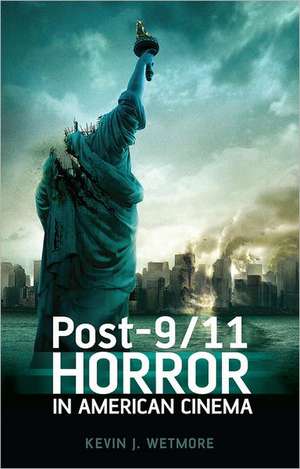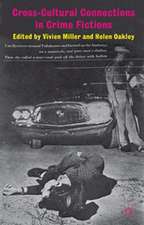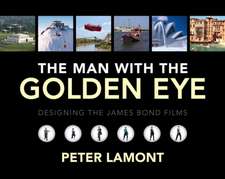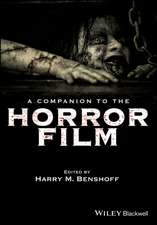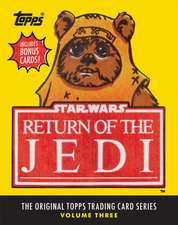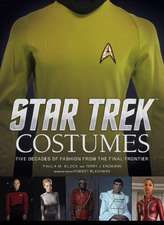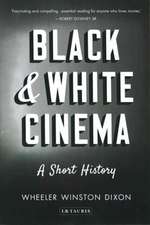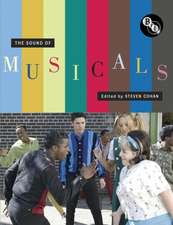Post-9/11 Horror in American Cinema
Autor Kevin J. Wetmore, Jr.en Limba Engleză Hardback – 23 mai 2012
The horror film is meant to end in hope: Regan McNeil can be exorcized. A hydrophobic Roy Scheider can blow up a shark. Buffy can and will slay vampires. Heroic human qualities like love, bravery, resourcefulness, and intelligence will eventually defeat the monster. But, after the 9/11, American horror became much more bleak, with many films ending with the deaths of the entire main cast.
Post-9/11 Horror in American Cinema illustrates how contemporary horror films explore visceral and emotional reactions to the attacks and how they underpin audiences' ongoing fears about their safety. It examines how scary movies have changed as a result of 9/11 and, conversely, how horror films construct and give meaning to the event in a way that other genres do not. Considering films such as Quarantine, Cloverfield, Hostel and the Saw series, Wetmore examines the transformations in horror cinema since 9/11 and considers not merely how the tropes have changed, but how our understanding of horror itself has changed.
Post-9/11 Horror in American Cinema illustrates how contemporary horror films explore visceral and emotional reactions to the attacks and how they underpin audiences' ongoing fears about their safety. It examines how scary movies have changed as a result of 9/11 and, conversely, how horror films construct and give meaning to the event in a way that other genres do not. Considering films such as Quarantine, Cloverfield, Hostel and the Saw series, Wetmore examines the transformations in horror cinema since 9/11 and considers not merely how the tropes have changed, but how our understanding of horror itself has changed.
| Toate formatele și edițiile | Preț | Express |
|---|---|---|
| Paperback (1) | 191.38 lei 6-8 săpt. | |
| Bloomsbury Publishing – 23 mai 2012 | 191.38 lei 6-8 săpt. | |
| Hardback (1) | 713.72 lei 6-8 săpt. | |
| Bloomsbury Publishing – 23 mai 2012 | 713.72 lei 6-8 săpt. |
Preț: 713.72 lei
Preț vechi: 914.77 lei
-22% Nou
Puncte Express: 1071
Preț estimativ în valută:
136.57€ • 142.31$ • 113.08£
136.57€ • 142.31$ • 113.08£
Carte tipărită la comandă
Livrare economică 03-17 aprilie
Preluare comenzi: 021 569.72.76
Specificații
ISBN-13: 9781441132956
ISBN-10: 1441132953
Pagini: 248
Ilustrații: 18
Dimensiuni: 138 x 216 x 20 mm
Greutate: 0.43 kg
Ediția:New.
Editura: Bloomsbury Publishing
Colecția Continuum
Locul publicării:New York, United States
ISBN-10: 1441132953
Pagini: 248
Ilustrații: 18
Dimensiuni: 138 x 216 x 20 mm
Greutate: 0.43 kg
Ediția:New.
Editura: Bloomsbury Publishing
Colecția Continuum
Locul publicării:New York, United States
Caracteristici
Very clear and accessibly written. Could also appeal to fans of the genre.
Notă biografică
Kevin J. Wetmore, Jr. is an associate professor of theatre arts at Loyola Marymount University, the author and editor of ten books including The Empire Triumphant: Race, Religion and Rebellion in the Star Wars Films, and a contributor to numerous volumes on sci-fi, pop culture and religion, including essays on Godzilla, Star Wars, and Battlestar Galactica. His areas pf expertise include Japanese theatre, African theatre, Shakespeare, Greek tragedy, stage combat and comedy.
Cuprins
Acknowledgements
Introduction: Terror and Horror
Chapter One: 9/11 as Horror
Cloverfield vs War of the Worlds
Chapter Two: Documenting the Horror
Cloverfield, Diary of the Dead, REC, Quarantine, Paranormal Activity
Chapter Three: "Because you were home": Anonymous and Random Death
The Strangers Chapter Four: "Torture Porn" and What It Means to Be American
Saw and Hostel
Chapter Five: Hopeless Bleak Despair
The Mist Chapter Six: Fear of Religion
End of the Line, House of the Devil and The Last Exorcism
Chapter Seven: Horrific Nostalgia: Remaking the Slasher Film
Conclusion
Bibliography and Filmography
Index
Introduction: Terror and Horror
Chapter One: 9/11 as Horror
Cloverfield vs War of the Worlds
Chapter Two: Documenting the Horror
Cloverfield, Diary of the Dead, REC, Quarantine, Paranormal Activity
Chapter Three: "Because you were home": Anonymous and Random Death
The Strangers Chapter Four: "Torture Porn" and What It Means to Be American
Saw and Hostel
Chapter Five: Hopeless Bleak Despair
The Mist Chapter Six: Fear of Religion
End of the Line, House of the Devil and The Last Exorcism
Chapter Seven: Horrific Nostalgia: Remaking the Slasher Film
Conclusion
Bibliography and Filmography
Index
Recenzii
This provocative and engaging study maps the transformation of the horror genre in the aftermath of 9/11, arguing that the hopelessness characterizing contemporary horror reflects the psychological and social impact of terrorism on American culture. Wetmore makes important links between the fear of terrorism and horror films, and he demonstrates-quite compellingly-that the horror genre has been one of the most effective tools for making sense of real terror. --Thomas Fahy, editor of The Philosophy of Horror and author of Sleepless and The Unspoken
On 9/11, horror unfolded in real life. Kevin Wetmore shows how its fallout infused the horror genre in cinema. His writing is clear, sharp and passionate. His book will appeal to fans of the horror film and to everyone interested in contemporary culture and its connections with historical trauma. -Stephen Prince, author of Firestorm: American Film in the Age of Terrorism
Post-9/11 Horror in American Cinema is a pleasure to read. Lively and astute, this wide-ranging survey of the recent horror film landscape demonstrates how the genre has changed after 9/11, both thematically and stylistically, to better echo our collective memory of an experience that continues to haunt us. Laden with visual and experiential references to 9/11, horror films represent trauma in box-office friendly fashion to echo our fears and ambivalence about torture, chaos, violence, and death. Rich with close film readings, this book will appeal to horror fans and film students alike. -- Isabel C. Pinedo, author of Recreational Terror: Women and the Pleasures of Horror Film Viewing, Film and Media, Hunter College CUNY
Post-9/11 Horror in American Cinema is a well-argued and researched investigation into the extreme trends of the genre. For both the connoisseur of horror and the academic, it presents an interesting vivisection of America's popculture response to a national trauma.
Post 9/11 Horror in American Cinema is a fascinating read that deconstructs the changes, both major and minor, in horror films since 2001. The author's theories are thought-provoking, well-supported by citation, and disturbing in an intellectually attractive way. While it tackles the subject from an academic perspective, the writing is extremely accessible. I highly recommend the book.
On 9/11, horror unfolded in real life. Kevin Wetmore shows how its fallout infused the horror genre in cinema. His writing is clear, sharp and passionate. His book will appeal to fans of the horror film and to everyone interested in contemporary culture and its connections with historical trauma. -Stephen Prince, author of Firestorm: American Film in the Age of Terrorism
Post-9/11 Horror in American Cinema is a pleasure to read. Lively and astute, this wide-ranging survey of the recent horror film landscape demonstrates how the genre has changed after 9/11, both thematically and stylistically, to better echo our collective memory of an experience that continues to haunt us. Laden with visual and experiential references to 9/11, horror films represent trauma in box-office friendly fashion to echo our fears and ambivalence about torture, chaos, violence, and death. Rich with close film readings, this book will appeal to horror fans and film students alike. -- Isabel C. Pinedo, author of Recreational Terror: Women and the Pleasures of Horror Film Viewing, Film and Media, Hunter College CUNY
Post-9/11 Horror in American Cinema is a well-argued and researched investigation into the extreme trends of the genre. For both the connoisseur of horror and the academic, it presents an interesting vivisection of America's popculture response to a national trauma.
Post 9/11 Horror in American Cinema is a fascinating read that deconstructs the changes, both major and minor, in horror films since 2001. The author's theories are thought-provoking, well-supported by citation, and disturbing in an intellectually attractive way. While it tackles the subject from an academic perspective, the writing is extremely accessible. I highly recommend the book.
